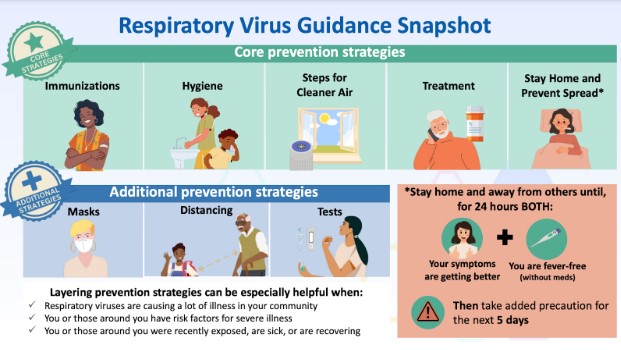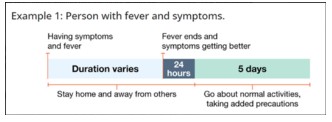Illness Guidelines
There are times when a student should remain at home for their own welfare and for the protection of other students.
The following criteria can be used to determine when a child should remain at home:
Has a cold in the contagious stage (first few days)
Sore throat and swollen neck glands accompanied by a fever
Undiagnosed rash or skin eruptions
Earache, red eyes, or drainage from eyes
Any communicable disease (see paragraph below)
Fever of 100 degrees or higher during the past 24 hours
Vomiting or diarrhea within the past 24 hours
If your student develops a communicable disease, e.g., chicken pox, strep throat, scarlet fever, or fifth disease, please notify the school nurse. This will enable us to monitor your child's progress and other student's exposure. Students should remain at home for a minimum of one day following the resolution of an acute illness. Please check your child’s temperature; a child should be "fever-free" for twenty-four hours without taking a fever-reducing medication such as Tylenol or Advil before returning to school. Remember that the essentials of good health are good nutrition, plentiful fluids, regular exercise, and plenty of rest.
The school nurse should be notified by the parent/guardian of any:
Serious injury, illness, or hospitalization
Planned surgery
Communicable diseases such as chicken pox, strep throat, scarlet fever, or fifth disease
New diagnosis or change in your child’s health status
Fracture, sprain, stitches, cast, or crutches (A physician's note is required for crutches and/or a wheelchair if one is to be used on the school premises.
New medication and/or dosing change.
Need to be excused from Physical Education.
Head Lice
To minimize the spread of infectious disease and provide a safe environment, the BPS Health Care Guidelines have been created to assist you. Please review this document as the nurses are required to adhere to these guidelines to help support the health of the entire school community.
Some key points of the illness guidelines about when to keep your child at home include the following:
Child has had a fever greater than 100 within the last 24 hours (fever should be under 100 for 24 hours without the use of fever-reducing medications before returning to school)
Child has experienced vomiting/diarrhea within the last 24 hours
Child has a communicable disease
Child has an upper respiratory illness with significant coughing and/or nasal discharge
Child has pain that requires the use of narcotic medications
Respiratory Virus Guidelines 2024 DPH
On March 25, 2024, the Massachusetts Department of Public Health updated its guidance to align with the recent CDC guidance:
Staying home to prevent the spread of respiratory viruses | Mass.gov
This guidance aligns with recent CDC updated guidelines for respiratory viruses, including COVID-19 released on March 1, 2024.
This guidance is for respiratory viruses like Influenza, RSV, and Covid-19 as they share similar transmission methods, symptoms, and prevention strategies. This unified approach aims to simplify recommendations and address common risks more effectively.

The new CDC guidance for respiratory virus:
When you have ANY respiratory virus - stay home and away from others if you have respiratory virus symptoms. These symptoms can include fever, chills, fatigue, cough, runny nose, and headache among others.
Return to normal activities when, for at least 24 hours, both are true:
Your symptoms are getting better overall, and
You have not had a fever (and are not using fever-reducing medication)

When returning to your normal activities, take added precautions over the next 5 days, such as taking additional steps for cleaner air, hygiene, masks, physical distancing, and/or testing when in the company of other people indoors.
Keep in mind that you may still be able to spread the virus that made you sick, even if you are feeling better. You are likely to be less contagious at this time, depending on factors like how long you were sick or how sick you were.
The updated Respiratory Virus Guidance recommends that people stay home and away from others until at least 24 hours after both their symptoms improve overall, and they have not had a fever (and are not using fever-reducing medication). Note that depending on the length of symptoms, this period could be shorter, the same, or longer than the previous guidance for COVID-19 isolation.
It is important to note that the guidance doesn’t end with staying home and away from others when sick. The guidance encourages added precaution over the next five days after time at home, away from others, is over. Since some people remain contagious beyond the “stay-at-home” period, a period of added precaution using prevention strategies, such as taking more steps for cleaner air, enhancing hygiene practices, wearing a well-fitting mask, keeping a distance from others, and/or getting tested for respiratory viruses can lower the chance of spreading respiratory viruses to others.
In addition to fewer people getting seriously ill from COVID-19 and having better tools to fight serious illness, the CDC considered other factors such as the personal and societal costs of extended isolation as well as the timing of when people are most likely to spread the virus (a few days before and after symptoms appear). The updated guidance is easy to understand, practical, evidence-based, and aligned with long-standing recommendations for other respiratory illnesses.
In addition to the CDC’s Respiratory Virus Guidance, there are several special considerations for people with certain risk factors for severe illness, including older adults, young children, people with weakened immune systems, people with disabilities, and pregnant people.
To read the complete report, click here. Also, the CDC has created an information FAQ page for the new respiratory guidance, available here.
